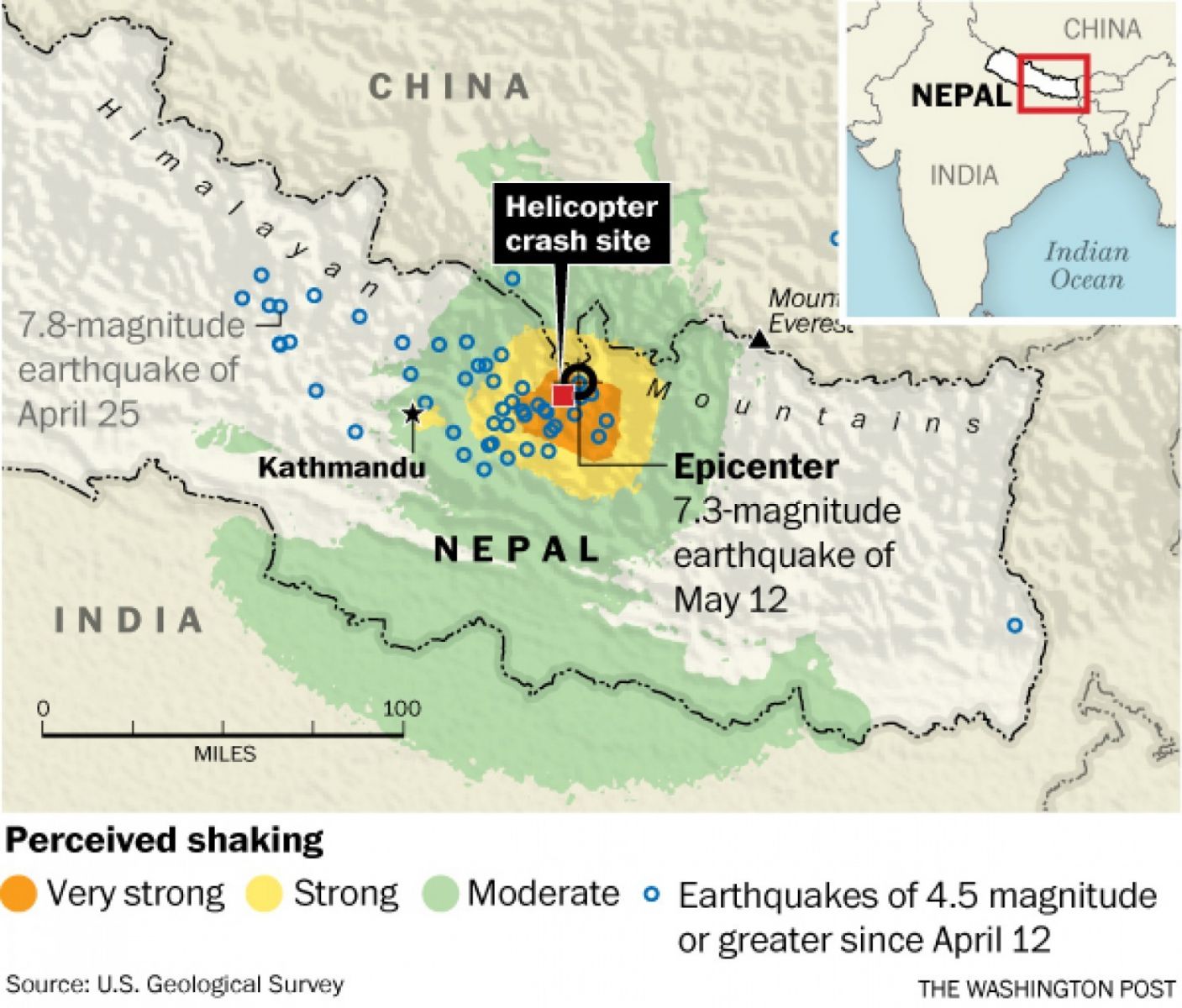NEW DELHI — Marine Capt. Chris Norgren was an accomplished pilot, but he had spent most of his time in Nepal building tents for those left homeless after April’s devastating earthquake, according to his father. But after a major aftershock Tuesday, he found himself in the air again.
Just moments after the 7.3-magnitude jolt hit, Norgren, 31, a Wichita native, piloted a UH-1Y Venom “Huey” helicopter on a relief mission through the northeastern part of Nepal, along with five other Marines and two Nepali army soldiers.
Later that afternoon, air traffic controllers lost contact with the chopper, triggering a wide-ranging three-day search involving U.S. troops and their Nepali army counterparts, who scoured the mountainous region by helicopter, on foot and in boats.
On Friday, U.S. military officials said the wreckage of the helicopter had been found in an area of “dense forest and exceptionally rugged terrain” about eight miles from the town of Charikot, where Tuesday’s relief mission had originated. A five-member U.S. unit reached the Himalayan site a few hours after the debris was spotted by the crew of a Nepali army helicopter. Locals had pointed the Nepali crew to the wreck site.
Early Saturday, Nepal’s military reported that the eight bodies of those on board had been recovered.
At a news conference Friday in Nepal, U.S. Marine Lt. Gen. John Wissler said that the cause of the accident was not known and that there was no initial sign of survivors.
“We all mourn this tragic loss of life,” Wissler said.
[View: Sorrow and struggles in Nepal]
The U.S. military has not released the names of the troops on board the aircraft, but Norgren’s father, Ron Norgren of Wichita, said in a telephone interview that officials had visited him and his wife Tuesday to inform them that their son was missing and then again Friday to let them know that helicopter wreckage had been found.
[Nepal on edge as earth still rumbles]
The helicopter crash was a reminder of the risks that rescue and aid workers will face in the days ahead as they help Nepal recover from the twin blows of the 7.8-magnitude April 25 earthquake that left more than 8,000 dead and Tuesday’s major aftershock, which killed at least 100 people in Nepal, northern India and Tibet.
The region is likely to continue to have aftershocks, experts say, and the threat of landslides and avalanches continues, especially as the rainy season sets in. Wind, rain and plunging temperatures at the crash site, at an altitude of about 11,000 feet, forced Wissler to cancel the recovery operation for Friday.
“This tragedy is a reminder of the vital but dangerous role that American servicemembers play in delivering humanitarian assistance and disaster relief,” Secretary of Defense Ashton B. Carter said in a statement Friday. But, he added, “Our mission continues in Nepal.”
President Obama also expressed condolences to the families of the six Marines and two Nepali army soldiers. Obama said the Marines “represent a truth that guides our work around the world: When our friends are in need, America helps.”
[Twin blows in the struggle to recover]
Norgren, the pilot, was part of a joint task force of Marines and Army soldiers sent to the region in May to help distribute relief supplies such as tarpaulins and food. The mission was dubbed Operation Sahayogi Haat, which means “helping hand” in Nepali, military officials said.
Ron Norgren said the family had last heard from their son on Mother’s Day, when Chris Norgren sent flowers to his mother, Theresa.
“We didn’t actually talk; we texted,” Norgren said. “I thanked him for remembering his mom, and I told him I was very proud of him for doing what he was doing, helping these people out and remembering Mother’s Day. He texted me back, ‘Thanks Pop.’ And that’s all I heard.”
Chris Norgren had a degree in aerospace engineering and mathematics from Missouri University of Science and Technology, where he also played football. A licensed pilot and aviation enthusiast, Norgren joined the Marines in 2009 after being laid off from a job at Cessna Aircraft and did an eight-month tour in Afghanistan, his father said. He was most recently stationed at Camp Pendleton, Calif. He had also worked as a substitute teacher and a football coach at his alma mater, Bishop Carroll Catholic High School in Wichita.
“I just want you to know he lived life the way he wanted to, and that meant helping people,” Norgren said. “And so I was blessed for 31 years. He was a great son.”
Pradeep Bashyal in Kathmandu and Missy Ryan, Brian Murphy and Jennifer Jenkins in Washington contributed to this report.


